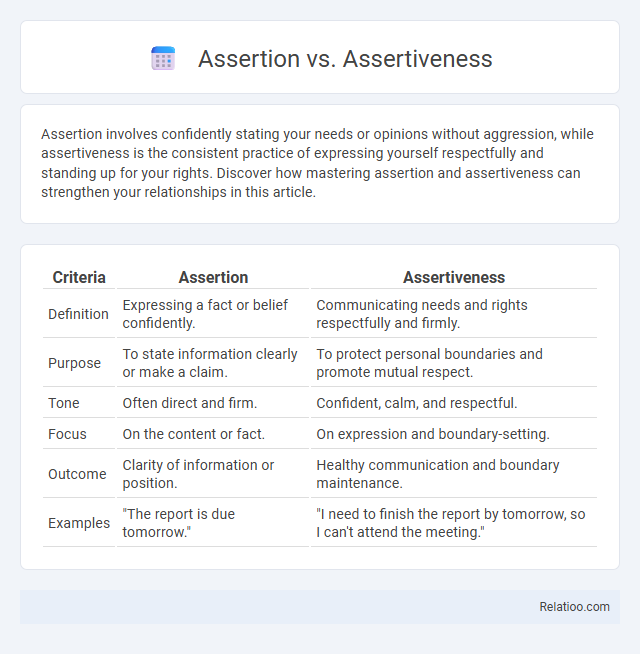Assertion involves confidently stating your needs or opinions without aggression, while assertiveness is the consistent practice of expressing yourself respectfully and standing up for your rights. Discover how mastering assertion and assertiveness can strengthen your relationships in this article.
Table of Comparison
| Criteria | Assertion | Assertiveness |
|---|---|---|
| Definition | Expressing a fact or belief confidently. | Communicating needs and rights respectfully and firmly. |
| Purpose | To state information clearly or make a claim. | To protect personal boundaries and promote mutual respect. |
| Tone | Often direct and firm. | Confident, calm, and respectful. |
| Focus | On the content or fact. | On expression and boundary-setting. |
| Outcome | Clarity of information or position. | Healthy communication and boundary maintenance. |
| Examples | "The report is due tomorrow." | "I need to finish the report by tomorrow, so I can't attend the meeting." |
Understanding Assertion vs Assertiveness
Understanding the difference between assertion and assertiveness is key to effective communication and self-expression. Assertion refers to a clear and confident statement of facts or beliefs, while assertiveness is the behavioral skill that allows you to express your needs and rights firmly yet respectfully. Your ability to practice assertiveness can improve relationships and ensure your voice is heard without aggression or passivity.
Defining Assertion: Key Characteristics
Assertion is a clear and confident expression of one's beliefs or rights, distinguished by direct communication without aggression. Key characteristics include firmness, clarity, and respect for others' viewpoints, enabling effective self-expression while maintaining interpersonal harmony. This contrasts with assertiveness, which is the broader behavioral trait encompassing consistent use of assertive communication across situations.
What Does Assertiveness Really Mean?
Assertiveness means confidently expressing your thoughts, feelings, and needs while respecting others' rights and boundaries. Unlike mere assertion, which is the act of stating something forcefully, assertiveness involves balanced communication that promotes mutual respect and understanding. This skill is essential for effective interpersonal relationships and conflict resolution, ensuring clear and respectful dialogue.
Core Differences Between Assertion and Assertiveness
Assertion is the act of confidently stating a fact or belief, while assertiveness refers to the skill of expressing your thoughts and rights respectfully without aggression. The core difference lies in assertion being a specific statement or claim, whereas assertiveness is the broader communication style that balances confidence and respect. Understanding these distinctions helps you communicate more effectively in both personal and professional contexts.
Psychological Foundations of Assertion and Assertiveness
The psychological foundations of assertion and assertiveness lie in self-confidence, effective communication, and emotional intelligence, enabling individuals to express their needs and rights without aggression or passivity. Assertion refers to the explicit statement or declaration of one's thoughts or feelings, while assertiveness embodies the behavioral skill of standing up for oneself in a respectful and clear manner. Your ability to balance assertiveness fosters healthy interpersonal relationships and promotes psychological well-being by reducing stress and enhancing self-esteem.
Benefits of Practicing Assertiveness Over Assertion
Practicing assertiveness promotes clear communication and respect for both your own rights and others', leading to healthier relationships and reduced conflict. While assertion often involves simply stating facts or opinions, assertiveness emphasizes expressing your needs confidently and empathetically, enhancing emotional intelligence and self-esteem. You gain greater control over interactions, improving collaboration and personal growth through assertive behavior.
Common Misconceptions About Assertion vs Assertiveness
Assertion refers to the clear and confident expression of one's thoughts, feelings, or rights, often misunderstood as aggressive behavior. Assertiveness embodies a balanced communication style involving respect for both oneself and others, which is frequently confused with dominance or passivity. Common misconceptions blur the distinction between assertive communication and assertion, leading to misinterpretations that hinder effective interpersonal interactions.
Real-Life Scenarios: Assertion vs Assertiveness in Action
Assertion involves clearly expressing your needs or opinions, while assertiveness reflects your overall confidence in communicating those boundaries respectfully. In real-life scenarios, your ability to assert yourself effectively helps maintain healthy relationships and avoid misunderstandings by standing firm without aggression. Practicing assertiveness boosts your influence and self-respect during conflicts, negotiations, or everyday conversations.
Tips for Developing Assertiveness Skills
Developing assertiveness skills requires understanding the distinction between assertion and assertiveness: assertion is the clear expression of your needs or opinions, while assertiveness is the confident, respectful communication of those assertions. To enhance your assertiveness, practice using "I" statements, maintain steady eye contact, and use a calm, firm tone to convey your message effectively. Your ability to stay composed during disagreements and to set healthy boundaries will significantly strengthen your interpersonal interactions and personal confidence.
Enhancing Communication Through Assertiveness
Enhancing communication through assertiveness involves expressing Your thoughts and feelings clearly and respectfully, setting it apart from mere assertion, which can sometimes come across as forceful or aggressive. Assertiveness balances confidence and empathy, fostering open dialogue and mutual understanding while avoiding the pitfalls of passive or aggressive communication. Mastering this skill improves personal and professional relationships by promoting honesty and clarity without compromising respect.

Infographic: Assertion vs Assertiveness
 relatioo.com
relatioo.com